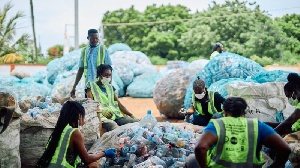- Home - News
- Elections 2024
- News Archive
- Crime & Punishment
- Politics
- Regional
- Editorial
- Health
- Ghanaians Abroad
- Tabloid
- Africa
- Religion
- Photo Archives
- Press Release
General News of Friday, 6 June 2025
Source: www.ghanawebbers.com
CCCFS applauds Mahama’s environmental pledges, urges stronger waste management measures
The Centre for Climate Change and Food Security (CCCFS) has praised President John Dramani Mahama’s recent environmental policies. They see these measures as vital for a sustainable and climate-resilient Ghana.
However, CCCFS has issued a warning. They urge the government to ensure that moving away from wood and styrofoam is supported by strong waste management strategies.
On World Environment Day 2025, President Mahama announced two key policies. First, wooden school desks will be replaced with recycled plastic or metal ones. Second, there will be a ban on importing and producing styrofoam packaging in Ghana. These actions aim to reduce environmental harm and promote a circular economy.
In a statement on June 6, CCCFS called the announcement "a strong example of environmentally responsible governance." They noted that these directives align with their advocacy for sustainable practices.
"Moving away from wood will help reduce deforestation," CCCFS stated. "Banning styrofoam addresses a major pollutant harming our waterways and wildlife."
The Centre emphasized that success depends on managing materials throughout their lifecycle. Dr. Alexander Nti Kani, an economist at CCCFS, expressed concerns about simply replacing one issue with another.
“Without clear end-of-life strategies for new desks, we risk creating more waste,” he warned. He also criticized the narrative around plastic recycling, referencing a report by the Center for Climate Integrity.
“Plastic recycling can be misleading in low-capacity countries,” he said. “Without proper infrastructure, these policies may backfire.”
CCCFS also commended the planned ban on styrofoam as significant. This aligns with the global campaign to “Beat Plastic Pollution” for this year’s World Environment Day.
Styrofoam is non-biodegradable and often clogs drains while polluting ecosystems. In response to these challenges, CCCFS provided several recommendations to the Mahama government:
1. Enact enforceable legislation to support these policy changes.
2. Develop a national program for recovering post-use furniture.
3. Partner with recyclers and manufacturers for sustainable take-back systems.
4. Help affected manufacturers transition to eco-friendly production.
5. Ensure new materials meet health and safety standards.
6. Launch public campaigns to change behavior regarding plastic use.
7. Promote community education on circular economy principles.
8. Vet alternative materials for potential environmental or health risks.
“Plastic pollution is a systemic threat,” they concluded in their statement. “It affects our air, food, and water.”
CCCFS pledged ongoing support to ensure Ghana's sustainability policies are ambitious yet carefully executed for lasting impact.











